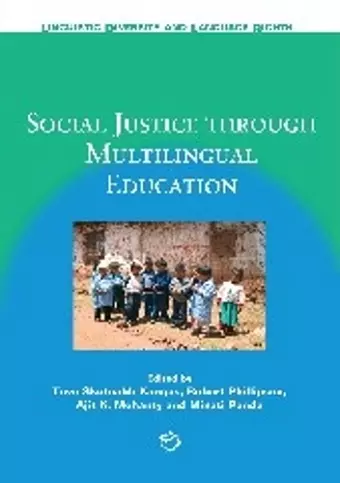Social Justice through Multilingual Education
Tove Skutnabb-Kangas editor Robert Phillipson editor Ajit K Mohanty editor Minati Panda editor
Format:Paperback
Publisher:Channel View Publications Ltd
Published:20th Aug '09
Currently unavailable, and unfortunately no date known when it will be back
This paperback is available in another edition too:
- Hardback£114.95(9781847691903)

The principles for enabling children to become fully proficient multilinguals through schooling are well known. Even so, most indigenous/tribal, minority and marginalised children are not provided with appropriate mother-tongue-based multilingual education (MLE) that would enable them to succeed in school and society. In this book experts from around the world ask why this is, and show how it can be done. The book discusses general principles and challenges in depth and presents case studies from Canada and the USA, northern Europe, Peru, Africa, India, Nepal and elsewhere in Asia. Analysis by leading scholars in the field shows the importance of building on local experience. Sharing local solutions globally can lead to better theory, and to action for more social justice and equality through education.
Noble in purpose, this volume contains many valuable accounts of efforts toward righting longstanding inequities of education in multilingual settings around the world -- from the highlands of Nepal and tribal language communities of India, to the Sámi lands of Scandinavia, to Native North America, and more. The authors passionately portray how very deeply languages matter, for every learner and all learners.
* Nancy H. Hornberger, Graduate School of Education, University of Pennsylvania, Philadelphia, USA *The book is a passionate call to respect and enshrine the inalienable right of all the children of the world to learn their languages and through their languages. The book is also a powerful indictment of the sinister privileging of languages like English that are marginalising and decimating humanity’s rich language resources. The book resonates with the contemporary Indian scene, where language, particularly as a medium of learning, has become a fiercely contested terrain.
* V. Vasanthi Devi, The Hindu, 11 August 2009 *This book is a wake-up call. It quashes the myth that monolingual education is the best way to progress. The book brings home the fact that the only way to arrest our shrinking knowledge-base is to impart multilingual education as an undivided whole, each language complementing and empowering the other.
-- Professor Anvita Abbi, Chairperson, Centre for Linguistics, School of Language, Literature and Culture Studies, Jawaharlal Nehru University, New Delhi.Social Justice through Multilingual Education places education centre stage in the demand for justice and rights for minority languages peoples. With a wealth of international examples, the book integrates boundary-breaking ideas about multilingual education with the movement for retaining linguistic diversity and achieving social justice for language minorities. A remarkable collection of papers written by many highly-respected authors makes this book essential reading.
* Professor Colin Baker, Pro Vice-Chancellor, Bangor University. *An extremely timely work, wide-ranging in its scope and depth, which addresses directly a still surprisingly controversial topic: the indisputable value of education in one’s own language.
-- Fernand de Varennes, Associate Professor, School of Law, Murdoch University, and Senior Research Associate (Non-resident) at the European Centre for Minority Issues.This book, edited and co-authored by some of the leading thinkers and doers in the MLE (Multilingual Education) enterprise, maps the different paths MLE has taken in extremely diverse local contexts on every continent. The book also promotes the cause of indigenous peoples’ social, economic and political rights - a struggle that needs far more public attention and support than it has received.
* Probal Dasgupta, Head, Linguistic Research Unit, Indian Statistical Institute, Kolkata. *As far as multilingual education is concerned and with regard to a synthesis of multilingual education worldwide, the present volume is a most welcome contribution to the topic. The various articles offer a wide range of thorough investigations on this important matter.
* Amani Lusekelo, University of Dar es Salaam and University of Botswana in Afrikanistik Online, 2011 *Each chapter is a superb contribution to MLE and social justice. This book will become a classic. It is a must-read for language educators and researchers everywhere, who see that the path to social justice is paved in multiple languages.
* Lee Gunderson, University of British Columbia (2010): Language and Education, 24:6, 545-548 *Social Justice through Multilingual Education is a gold mine for educators concerned with issues of social justice more broadly conceived. It clearly and articulately offers the case for why (and, in fact, how) matters of language, bilingualism, multilingualism, and both language oppression and language empowerment must be addressed if our goal is truly social justice for children in schools. It is an extremely important and valuable contribution to the literature, and we owe a debt of gratitude to the editors and authors for their hard work in making it available.
-- Timothy Reagan, Central Connecticut State University in Language Problems and Language Planning 35:3 (2011) 276-278The hopeful and, at times, confrontational themes in the book provide scholars and researchers with much to think about as they develop future projects. the compilation offers readers critical but optimistic impressions of the usefulness of MLE and impels practitioners to develop these impressions within their own local contexts.
* Mariam Durrani, University of Pennsylvania in Language Policy (2011) 10:265-2ISBN: 9781847691897
Dimensions: 234mm x 156mm x 21mm
Weight: 623g
408 pages